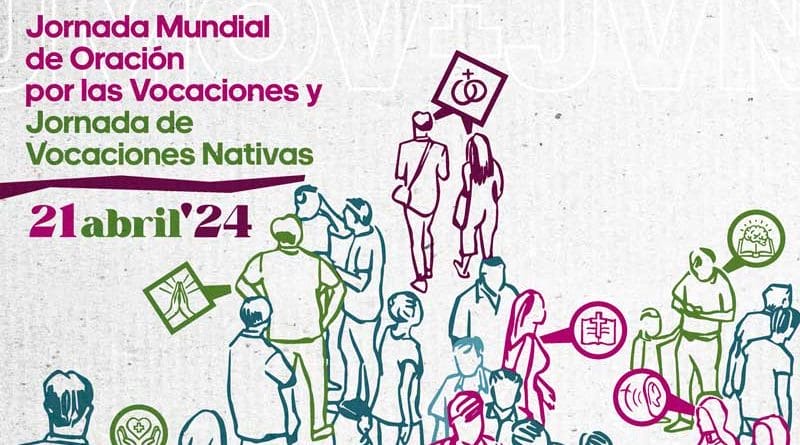For 61 years now, a day of prayer for vocations has been held throughout the Church. It was Pope Paul VI who, at the time of the Second Vatican Council (1962-1965), launched this initiative through a message. Successive popes have followed up and each year write a message about the importance of vocation and vocations in the Church.
It is a day of reflection on the mystery and beauty of vocation and vocations but, above all, it is a day of intense prayer to the Lord of the harvest, that He may send workers for the harvest (cf. Luke 10:2).
The context of the life of the Church in which the day is inserted is always the Fourth Sunday of Easter or Good Shepherd Sunday, as it is also known because the passage of the Good Shepherd from the Gospel of John (cf. John 10:1ff) is read at the celebration of the Eucharist.
This year 2024 Pope Francis titles his Message for the World Day of Prayer for Vocations “Called to Sow Hope and Build Peace“. Vocation, as a divine call, cannot disregard the occasional calls to which the Holy Spirit places us in the concrete circumstances of history. In this sense, in the face of a hopeless and confrontational society, the Pope calls upon every vocation and all vocations to sow hope and build peace.
The Pope’s speech is a message that anticipates the celebration of the Jubilee Year of 2025, which has as its motto “pilgrims of hope“. And in preparation for the Jubilee, in 2024 Francis called for a year of Christian prayer; an occasion to grow in the awareness of being in the presence of a Presence that brings a sense of hope to life and directs it to true happiness. Hence, prayer for vocations, sowing hope and building peace are the central themes of the Message.
Pope Francis opens the message by inviting the faithful people on the way to consider the precious gift of the Lord’s call, and to incarnate the beauty of the Gospel in the project of love of each state of life. Nothing like the free response to vocation helps to nourish the desire for happiness that all human beings carry within us, the Pope also suggests.
From the Pope’s extensive and thought-provoking Message for the 61st World Day of Prayer for Vocations, we will focus on what he says to young people:
“To young people, especially to those who feel alienated from or distrustful of the Church, I would like to say: let yourselves be fascinated by Jesus, ask him your fundamental concerns. Through the pages of the Gospel, let yourselves be disturbed by his presence, which always puts us in crisis in a beneficial way. He respects our freedom, more than anyone else; he does not impose himself, but proposes himself. Make room for him and you will find happiness in following him and, if he asks you, in total surrender to him.
We could calmly consider the Pope’s four provocations to young people: let yourselves be fascinated by Jesus, ask him your fundamental concerns, let yourselves be disturbed and give space to Christ and you will find happiness in following him. To allow oneself to be fascinated by Jesus, to pray the fundamental questions of the heart, to allow oneself to be disturbed and to follow Christ.
Now, not content with these four provocations, he closes the Message with a fifth:
“I say to you once again, as I did during World Youth Day in Lisbon: “Rise up! – Get up! Let us wake up from sleep, let us emerge from indifference, let us open the bars of the prison in which we so often shut ourselves up, so that each of us may discover our own vocation in the Church and in the world and become pilgrims of hope and peacemakers. Let us be passionate about life and commit ourselves to the loving care of those around us and the environment in which we live. I repeat: have the courage to get involved!
This is the call of Jesus to young people in the Gospels: Arise! That means to wake up, to leave indifference behind and to bet on freedom… These are the conditions of possibility to be pilgrims of hope and builders of peace.
Pope Francis is clear: the transformations that we long for in our society will only take place when we have a passion for life and compassion for those who are close to us, especially those who suffer. In this sense, vocation is the way in which Jesus, the Lord, brings us fully into life and involves us deeply in it.
Fabián Martín Gómez, Augustinian Recollect


